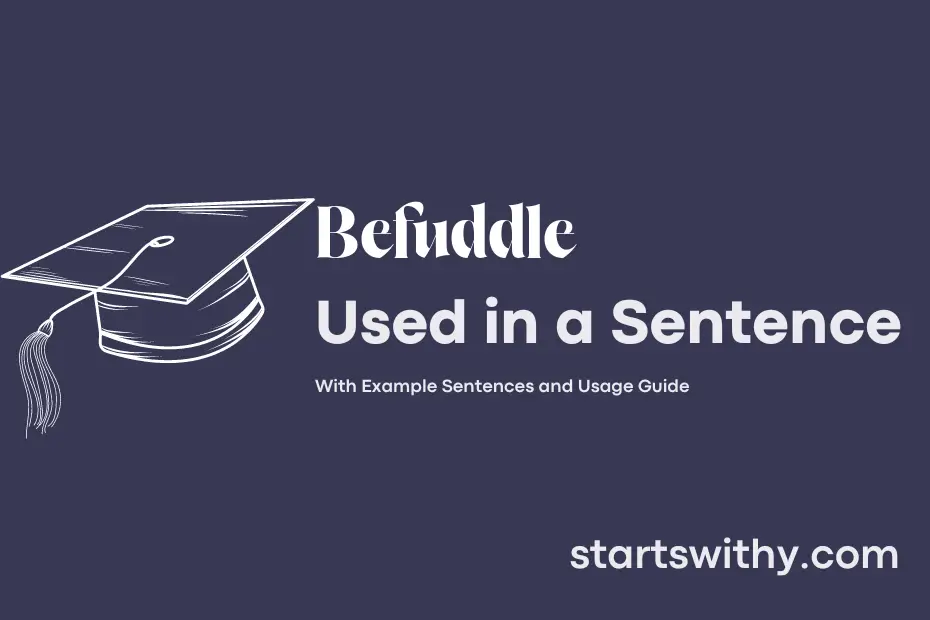Have you ever read a sentence that completely befuddled you, leaving you scratching your head in confusion? To be befuddled is to be puzzled, perplexed, or utterly bewildered by something.
When a sentence manages to befuddle us, it can be a frustrating experience. This feeling of being completely lost in a jumble of words is what happens when a sentence leaves us unable to grasp its meaning.
7 Examples Of Befuddle Used In a Sentence For Kids
- The tricky puzzle may befuddle your mind.
- Trying to solve a riddle can befuddle you.
- Too many choices can befuddle decision-making.
- A confusing maze might befuddle you at first.
- Learning new words may befuddle you, but keep trying!
- A jumble of letters can befuddle spelling practice.
- Following complex directions may befuddle you, but ask for help.
14 Sentences with Befuddle Examples
- The complex new course material befuddles many students in their first semester.
- Trying to juggle assignments, extracurricular activities, and a part-time job can befuddle even the most organized college student.
- The professor’s rambling lectures often befuddle students, making it difficult to follow along.
- The sudden change in examination format befuddles many students who were used to a different pattern.
- The lack of clear instructions on the assignment befuddles students, leaving them unsure of what is expected of them.
- The complicated mathematical problems in the physics assignment befuddle students who are not strong in the subject.
- Navigating the vast library database can befuddle students looking for specific research materials.
- The overwhelming amount of information presented in the lecture notes can befuddle students trying to study for exams.
- The constant changes in the timetable have befuddled many students, causing confusion about class timings.
- The tricky questions in the quiz befuddle students who did not pay attention during the lectures.
- The complex paperwork required for applying for internships can befuddle college students who are new to the process.
- The contradictory information given by different professors befuddles students trying to write research papers.
- The technical glitches in the online examination platform befuddle students during their final exams.
- The elaborate campus event planning process can befuddle students volunteering for organizing committees.
How To Use Befuddle in Sentences?
To Befuddle means to confuse or perplex someone. When using this word in a sentence, it is important to ensure that the context makes it clear how someone is being confused or bewildered.
Here is a simple guide on how to use Befuddle in a sentence for beginners:
-
Identify a situation where someone is feeling confused or puzzled. For example, “The complex instructions from my boss began to befuddle me.”
-
Insert the word Befuddle into the sentence at the appropriate place. Make sure it is used correctly to convey confusion or perplexity. For instance, “The math problem was so challenging that it started to befuddle me.”
-
Ensure that the sentence flows naturally and the word Befuddle fits seamlessly into the context. Avoid using it in a way that feels forced or out of place.
-
Read the sentence out loud to see if it accurately conveys the intended meaning of confusion or bewilderment. If it does not, consider revising the sentence to improve clarity.
By following these steps, beginners can effectively incorporate the word Befuddle into their sentences to accurately express confusion or perplexity. Remember that practice makes perfect, so continue using the word in various contexts to become more comfortable with its usage.
Conclusion
In conclusion, sentences with the word “befuddle” often depict situations where individuals are confused, puzzled, or perplexed by something. These sentences highlight the state of being mentally unclear or muddled, suggesting a sense of disorientation or bewilderment. The word “befuddle” encapsulates a state of mental confusion, emphasizing the feeling of not being able to comprehend or make sense of a situation.
Through these examples, we see how “befuddle” is used to describe moments of mental fog or uncertainty, showcasing the complexity and challenges of understanding certain situations. Whether it is in literature, conversations, or everyday life, sentences with “befuddle” are commonly employed to communicate a sense of mental confusion or perplexity that individuals may experience.



